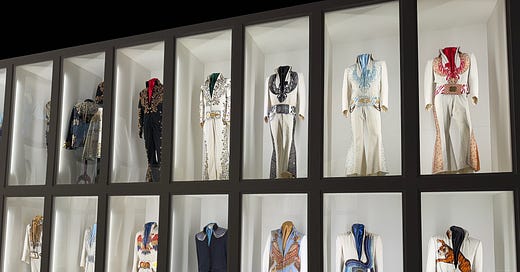What Graceland Can Teach You About Money
Too young to die, Elvis reminds us money isn’t everything.
When used wisely, money can enrich our lives with meaning, fulfillment and, at times, joy. It can, and should be used to create beautiful things, unite families, provide stability, and enable us to pursue more important ambitions beyond mere wealth. When used unwisely and without purpose even vast fortunes can lead to emptiness.
Earlier this month we took a trip to celebrate both my Mom’s 75th birthday in Colorado, and Andrew’s Grandaddy’s 85th birthday in Memphis. In between the celebrations and family visits, we visited the iconic home of Elvis Presley—Graceland.
I am not much of an Elvis fan, but my Mother is. When I mentioned going to Memphis the first thing she asked was if I was going to visit Graceland. I figured, I may not get back to Memphis anytime soon, and she won’t be the only one asking—so Andrew and I dropped in. Before our visit I didn’t much about the man; I knew his music and that he died tragically at age 42.
Graceland gave me an entirely new appreciation for Elvis; what a talented singer he was—and an entertainer like no other. But his death is also one of the saddest pop culture stories of our time. The sadness of his very short life is still with me—it’s lingered since we visited his estate.
Graceland is more than just the mansion. On over thirteen acres, there are numerous museums showcasing all facets of his career—his music, movies, car collection, clothing, and even his private jets. I had no idea the scale of his wealth and fame or even the staggering cultural impact he made. There is so much displayed for all to see about his life, but there was one major aspect scarcely mentioned—his death and the reasons and circumstances behind it.
When you tour the mansion, you cannot go to the bathroom where he died. The material and information in the mansion and museums only hints at an early death and indicates nothing in depth about how/why it happened. I told Andrew that if you were an alien dropped into Graceland, knowing nothing about Elvis, you would think he was a cultural icon who just vanished in the late 70s. In my opinion, his tragic and early death is one of the most important parts of his story—the one we should all learn from and try to understand how to avoid in our own lives and as a society.
There are many lessons to take from his death. Of course, the “don’t do drugs” and abuse your body is the most obvious. But what I think the most important lesson was from his life and death is that nothing will satisfy you if you don’t have a purpose beyond fame and fortune. Elvis had everything society tells us is desirable: fame, fortune, cars, houses, and adoring fans. None of that saved him from an unnecessarily early and senseless death.
Instead of using his money to direct his life in a way that made him and those around him better he drowned his feelings of emptiness in drugs, fame, and food1. His marriage crumbled, his relationship with his daughter was strained, and the Graceland exhibits barely mention any other relationships that could have grounded him— people who he loved and could exist with away from status and wealth. There was mention of two relationships—his father and manager who possibly used his talent to enrich themselves. And of course, this certainly would contribute to some of his difficulties, but even then, what Elvis Presley didn’t have was a real purpose that enriched his life.
Years ago I read an article about Michael Jackson’s death. In it was a quote that went something like “Michael Jackson died alone with the one person who could save him.” This same sentiment certainly applies to Elvis Presley.
Note, he did charitably give to larger causes such as St. Jude’s but that seemed perfunctory—he had no real involvement in the broader purpose of these charities.




